As a coach, you want to model healthy boundaries and low drama for your clients. If you use clear life coaching terms and conditions when your clients purchase coaching sessions from you, you will build a healthy coaching relationship from the get-go and lower everyone’s stress at the same time.
If you aren’t sure where to start with putting together your T&Cs, check out the coaching terms and conditions template in this post. By the end, you’ll have a better grasp of all the legal terminology and applicable regulations surrounding this legally binding document.
What are Life Coaching Terms & Conditions?
Terms and conditions are legal agreements or legal documents that people agree to automatically when they purchase online services or products, functioning similarly to an end-user license agreement.
The idea is that everyone is automatically bound (or legally obligated) to the terms of your Terms & Conditions without having to sign a formal document, as long as you’re under the same governing law. It’s a form of legal protection for coaches.
But this “automatic” process isn’t actually automatic unless you do it right. Life coach terms and conditions need to be specific to the services you are providing and may be legally required in some jurisdictions. They are a way to ensure both you and your client get what you want from your mutual agreement and coaching relationship, while also protecting against abusive users who might violate your policies.
How To Apply Your Terms and Conditions Without Signing a Contract
It’s not enough to have the terms in some random back corner or footnote of your website. If you want your clients to be bound to your terms, you must link the terms from where your clients are buying coaching sessions and have them actually agree to the Terms.
For example, when you make a purchase from websites such as Amazon, they state, “By placing your order, you agree to Amazon’s privacy notice and conditions of use” right below the “Place this Order” button. By clicking this button, the client agrees to Amazon’s terms. You may not have actually noticed it, but you have an opportunity to read the linked privacy notice and conditions of use each time you make a purchase from Amazon. That’s why you are bound to their Privacy Policy and their terms.
Such content is part of consumer protection regulations. It’s at your sole discretion not to buy from a website if you don’t agree with their terms.
When To Use a Contract or Electronic Signature For Legally Binding Documents
For some of your high-end programs, or if your coaching process is complicated or long-term, you may want to require your clients to check a box or even sign a document using e-signature software.
It’ll come in handy in case of dispute resolution.
This is especially helpful if you want to alert clients to terms like delayed recurring payments or if it is an intensive mentorship-type program where you want them to agree to specific rules of behavior.
What Goes into an Online Coaching Agreement?
The first section of any legal agreement covers the basics of what each side will deliver: what you are doing, what they are doing, and what neither of you will do.
If you are only selling one type of service or product on your website, your terms might describe your coaching sessions or programs in detail, stating how long the coaching sessions will be and how many are in each package, or whether you sell them on a per session basis, for example.
But if you sell many types of services and products, your contract for coaching services might state something general like:
“The product or service as described on the sales page as of the date of your purchase.”
Exactly What to Include: Timing, Delivery, Downloads, Expiration
In this section, describe any limitations on timing or delivery, such as how long they have to use further coaching sessions or whether they are allowed to download multiple copies of an ebook.
If you have a service or product that expires after a certain timeframe, check with local laws to determine if you need to give a refund or credit.
Explain What Isn’t Included
Don’t forget to include what you are not including as part of your coaching services or products.
For example, some clients may assume that email coaching or texting is included in any coaching program. Some coaches do their coaching both in-person and virtually, but some only do coaching via telephone and video conference. You may or may not provide recordings of calls (get their permission now to record their voice and/or image).
Make it clear what additional digital products or coaching sessions you provide will require extra or advanced payments. Clarity is important to avoid misunderstandings later.
Set Clear Expectations For Client Behavior
Let your clients know how you expect them to behave throughout your coaching schedule.
You likely expect them to:
- Show up on time for coaching sessions
- Do preparation work such as readings or “homework” assignments
- Communicate with you regularly regarding their progress
- And so much more
Outlining your client’s tasks ahead of time will help deepen your coaching relationship, manage expectations, and help you track your client’s progress.
You may also include information here about appointment policies, such as rescheduling or rearranging sessions.
For example, should the client notify you at least 24 hours ahead of time? What are your no-show policies, and do you offer refunds for coaching services? If so, in what instances do you offer those refunds? Do you charge a per-session fee for cancellations, and is cancellation only allowed in the event of an emergency?
You have to be crystal clear about the only instances clients can get a full refund or a chance to book a subsequent session for their coaching sessions.
If you have group coaching programs or online forums, have rules regarding:
- Spam
- Hate speech
- Confidentiality
- How clients will communicate with their fellow students
These rules will help avoid any inappropriate behavior and stand as a mutual agreement among students of your programs.
Getting Paid, Refund Policies, & Late Fees
Your Terms and Conditions for life coaching should also contain a description of how your coaching clients follow your payment terms, will pay you, and pay you on time for their coaching sessions. This includes a coaching contract cancellation policy.
If you have clients purchasing sessions or programs online, most likely, they are paying you ahead of time (which is recommended) for additional sessions. This simple solution will solve much of your collections problems since you don’t need to chase after clients to pay their invoices or awkwardly get their credit card number at the end of an impactful session.
Just ask for your client’s prior permission to charge their card after the session.
Payment Plans and Recurring Payments
You also need some other language in this section to address future payments, such as if your clients are agreeing to recurring payments for installment programs (a payment plan for a fixed-cost program) or regularly recurring payments for a monthly program that they can cancel.
For example, when creating a coaching package in Paperbell, you can choose to offer:
- One-time payments
- Payment plans
- Subscriptions
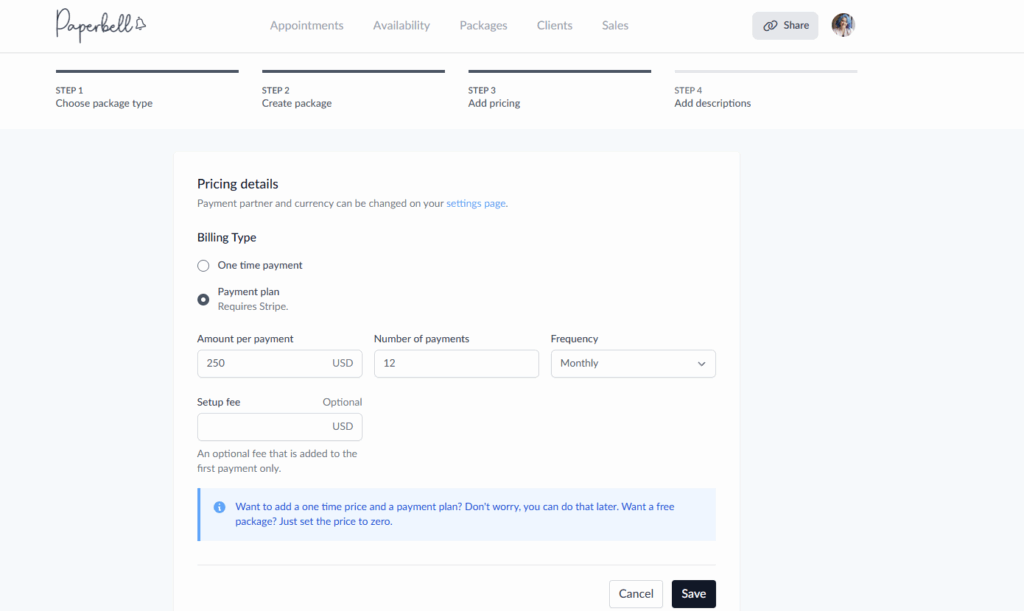
Your language needs to state that they agree, in advance, for you to keep charging their credit card on file each month, quarter, or year. State how they can cancel the recurring program and what happens if they cancel mid-period and don’t want further coaching sessions.
With Paperbell, this information gets stated with crystal clarity on the booking page. For instance, here’s what a three-times-monthly payment looks like for coach Sarah Novaro on her The Thriving Artist package:

You can see that this page lays out:
- The total price ($1800)
- How many payments (three), at what price ($720), and at what frequency (monthly)
- What the package includes (12 x 75 minute appointments)
And the same information gets stated again once a client is about to check out using Stripe:

Try out Paperbell for free to simplify your terms and conditions (and so much more) for your coaching business.
Rejected Cards, Charge-Backs, and Late Fees
Think about what will happen if their payment bounces or they do a charge-back on what they already paid you for their coaching sessions.
Usually, you will have a term for late fees, collection costs, and attorney fees. Late fees have a maximum allowed in some areas, so check what local law requires.
You may also expressly state that they will no longer receive services or will be removed from the coaching schedule and program if their payments stop. If you have a no-refund policy for coaching services, you need to state why, like the fact that each booking reserves a limited spot in your calendar that can’t easily be filled on short notice.
Refund Policies
Refund policies and “money back guarantee” programs need to be detailed clearly.
Some coaches will offer a first coaching session where the client can receive a refund if either side finds they are not a good fit. Some coaches offer limited “money-back guarantee” programs for courses if the student does all the homework and does not see any value, if requested by a certain time. If you offer one of these programs, know that limited homework-required guarantees tend to be a source of drama, so be sure to clearly define the terms of your policy ahead of time and make it as straightforward as possible.
You also need to be careful of up-to-date regulations with the Federal Trade Commission (FTC). In 2025, making income claims with money-back guarantees is extremely risky.
So how do you navigate this?
A great example is the 7-Figure Author Career Mentorship Guarantee. They have a page specifically for their guarantee to outline how it works.
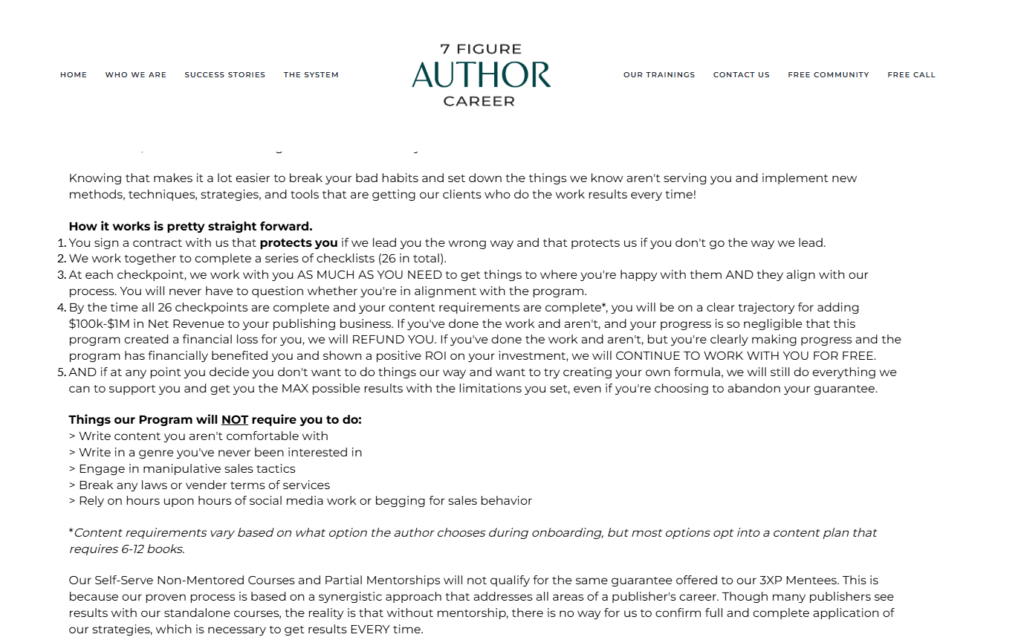
But they also specify what you won’t be required to do, and how these terms comply with the FTC, including what they legally aren’t able to promise:

Instead of promising you’ll make six or seven figures, they clarify that they guarantee you’ll get your money back if you do not hit a specific income threshold. In the eyes of the law, that makes a big difference.
What about unused coaching sessions? If a client has sessions left because they decide they no longer need your coaching services, or can’t continue because of other commitments, can they get a refund? Make sure to clearly outline your cancellation policy for personal coaching ahead of time.
What Legal Terms Are Required For Coaches?
If you are giving your clients any materials or teaching them proprietary systems or intellectual property that belong to you, set expectations that they cannot take those materials or ideas and post them online or use them in their own practice. Define that signing up to your coaching session constitutes acceptance that the intellectual property rights belong to you.
Depending on how much intellectual property you’ll share with your clients, it may be worth having an entire intellectual property clause.
You can even state that you may be launching a licensing or certification program eventually, and they can contact you to obtain more information (great way to build interest for later!).
Clarify That You Aren’t a Therapist or Providing Mental Health Care
Make sure to define what profession and type of practice this is, and what it is not.
For example, if you are a life coach, state that you are not a mental health counsellor providing therapy, mental health advice, or medical advice. Make it clear that your coaching session program covers life coaching only and not professional mental health care.
If you are providing budgeting coaching, you would need to state that you are not a registered investment advisor or financial planner. If you offer business coaching or executive coaching, you would need to state that you’re only providing a mentoring service and not making business decisions for your coachees.
Clear boundaries will avoid any future problems or misunderstandings.
The disclosures you need depend upon your type of practice; it’s all about preventing confusion for your specific clients. You want your clients to know what you are qualified to do and what licenses you don’t have or are not using.
If something goes wrong in the coaching process, your terms should state what happens.
Since many of you will have clients purchasing services and products who are located in different states or countries than where you are located, it makes sense to include non-litigation options, such as mediation and arbitration, in your coaching disclaimer. If you also see local clients in person, you can include a Small Claims Court option for when it is appropriate, since that’s the simplest and least expensive way to resolve many disputes.
Other Legal Terms To Include In A Terms And Conditions Agreement
There are other legal terms you may want to include, such as:
- Governing law or applicable law (what country/state’s law applies to interpret your terms)
- Force majeure (no one has to do anything if an act of God or war makes it impossible)
- Severability (if one clause is illegal, the rest of the terms are still okay)
- No assignment (they can’t assign these sessions to another person)
- Termination clause (how and when a party can terminate the coaching agreement)
- Liability clause (limits or defines each party’s legal responsibility for damages, losses, or injuries that might occur during the course of the agreement)
You should also reassure clients with a confidentiality personal information clause so they have peace of mind about what you do with their details.
Finally, you should seek legal advice from reputable service providers if you’re unsure of what to include in your own legal documents. A lawyer can walk you through:
- Comprehensive terms and conditions examples
- How to create a legally binding contract
- The legal risks associated with inadequate terms and conditions
- Your legal requirements as a coach
- And much more!
Why Do Coaches Need Terms and Conditions?
You should always have a basic life coaching agreement before you sign new clients. But if you end up needing to use the terms and conditions specifically, it will most likely be because someone does a charge-back via your merchant account, which can happen months after you deliver your services or products.
This is typically because they are unhappy with the coaching sessions and program, and are using a fee dispute to cancel and get a refund. If that happens, you need to be able to show they agreed to the terms and they have already used the sessions or program. Or, you need to show that the client agreed to a “no refund” policy at the time of purchase.
Asking your client to sign terms and conditions before they take coaching sessions with you also gives you peace of mind that you will be covered should anything go wrong. You can’t achieve business success in an unregulated industry without some basic terms.
You will also deepen your coaching relationship if you start with a clear outline of what both the coach and the client should expect right from the first coaching session. A coaching agreement with your clients helps to avoid any actual or potential conflict.
If you skip adding a terms and conditions agreement, you do so at your own risk.
How To Show Evidence During a Dispute Agreement
If you have specific evidence of a client’s agreement or other user behavior during the dispute resolution process, such as a checkbox with an IP address or an e-signature with a date (like the ones already integrated in your Paperbell coaching agreements), that will be helpful.
If you have nothing to show the merchant account company, they might not help you with this dispute, especially if you can’t prove the “no refund” policy or you can’t prove that the client allowed the recurring charges.
Terms And Conditions Template For Coaches
It’s much easier to create a terms and conditions page when you have a template to start from. When you create your free Paperbell website, you’ll get a chance to add a Terms and Conditions page at the footer of your website without building it yourself.
Here’s what it looks like on Coach Sorrel Pindar’s Paperbell site:
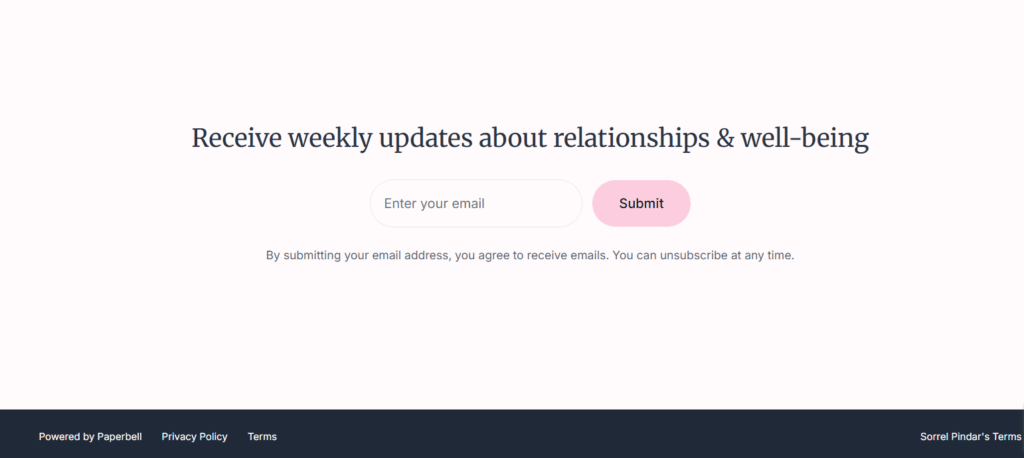
When creating your coaching packages, you’ll have the option to add your own link to a separate terms and services page. Alternatively, you can grab the terms and conditions templates specifically for coaches that Paperbell has prepped for you!
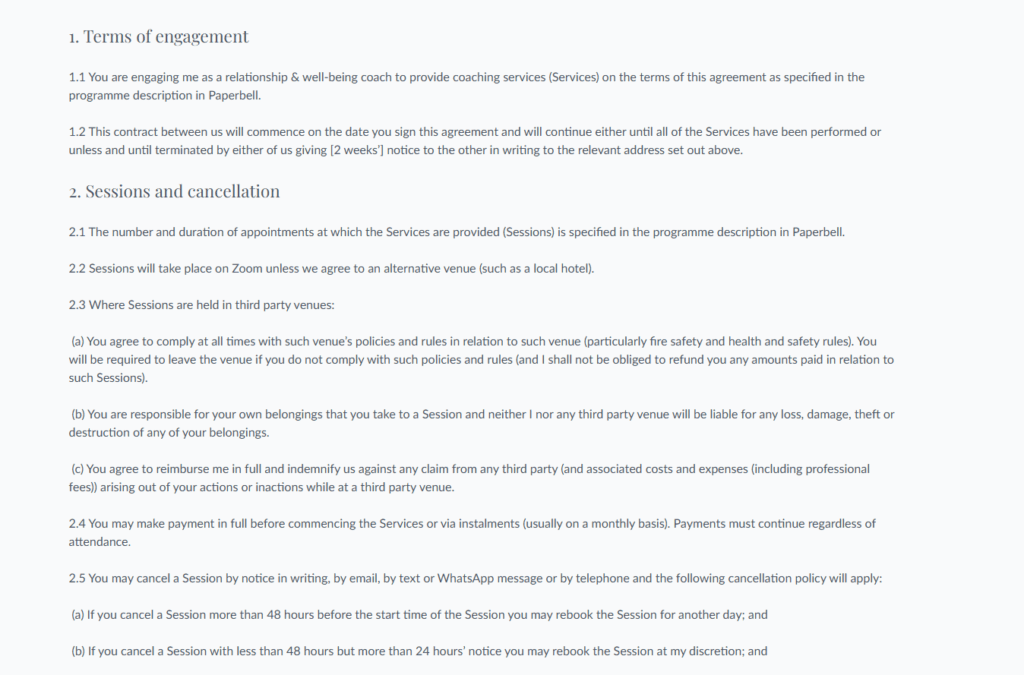
To get your terms and conditions template, grab a free trial of Paperbell and launch your coaching website in minutes.
FAQs About Terms And Conditions For Coaches
What should a coaching agreement include?
A coaching agreement should cover what each side delivers, timing and delivery details, client behavior expectations, payment terms, refund policies, and legal disclaimers. Include specifics like session length, package details, appointment policies, and what’s not included in your services to avoid misunderstandings.
Do life coaching terms and conditions cover your back?
Yes, terms and conditions protect you from charge-backs, payment disputes, and client misunderstandings by establishing clear agreements upfront. They provide evidence of what clients agreed to and help resolve conflicts, especially when clients attempt refunds months after receiving services.
Can a coaching contract be extended and renewed?
Yes, coaching contracts can include recurring payment terms for ongoing programs or subscription-based services. Your terms should clearly state how clients can cancel recurring programs, what happens with mid-period cancellations, and how future payments will be processed automatically.
How do I write my own terms and conditions?
Start with a coaching template, then customize for your services. Include what you provide, payment terms, cancellation policies, client expectations, liability limitations, intellectual property rights, third party links disclaimers, governing law clause, and how you inform users of updates.
Create T&Cs For Your Coaching Journey
Ultimately, life coaching terms and conditions cover your back and make your coaching relationship honest from the outset. They will help you achieve desired business outcomes sooner and help you run your business honestly and efficiently.
You want to offer coaching sessions based on trust after all, right?
Don’t skip the details by telling your client early what you expect, and you’ll be grateful in the long run. If people know where they stand when purchasing coaching services from your website, everyone knows what happens if anything were to go wrong in the future.
So, go start your professional coaching journey and let your coaching sessions commence on the right foot.
And don’t forget to try Paperbell for free to access your terms and conditions template and so much more.
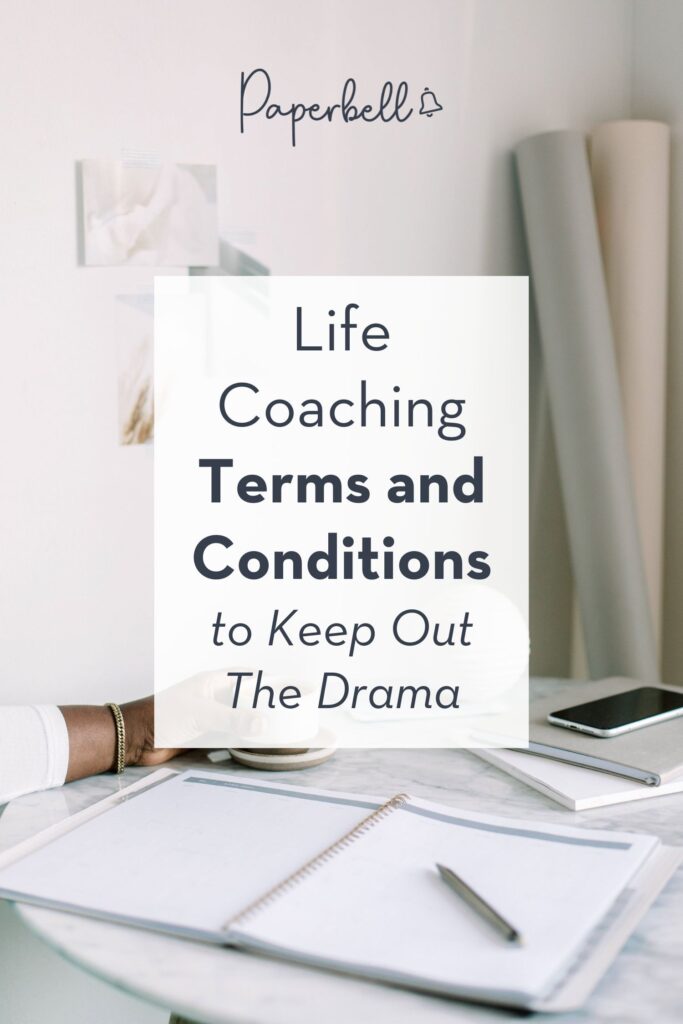
This is a guest post. Learn more about writing for us here.
Editor’s Note: This post was originally published in March 2023 and has since been updated for accuracy.








